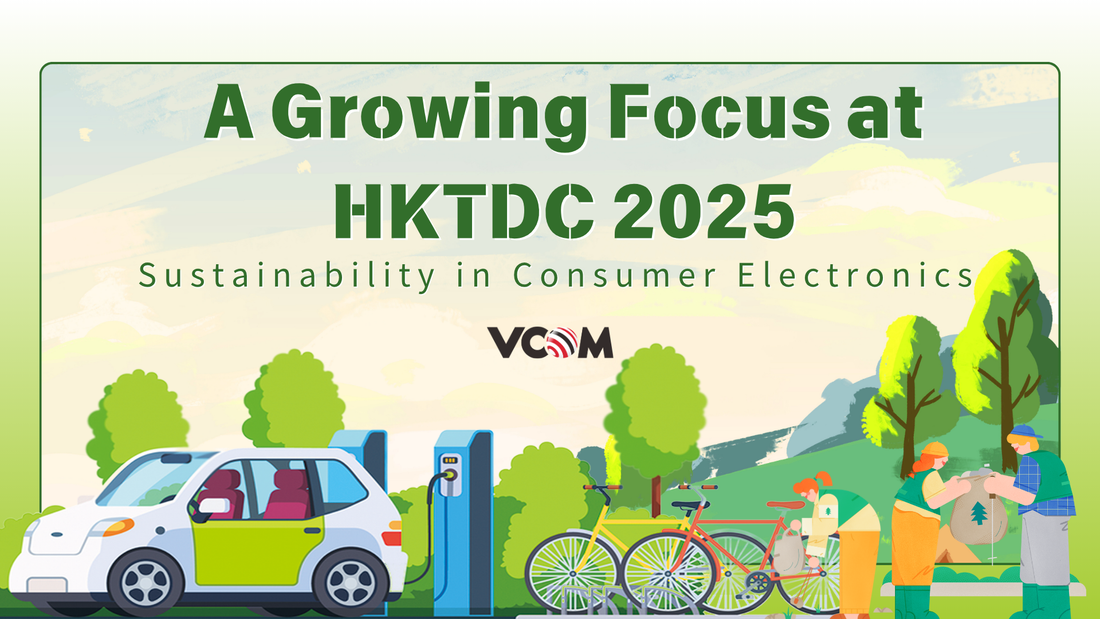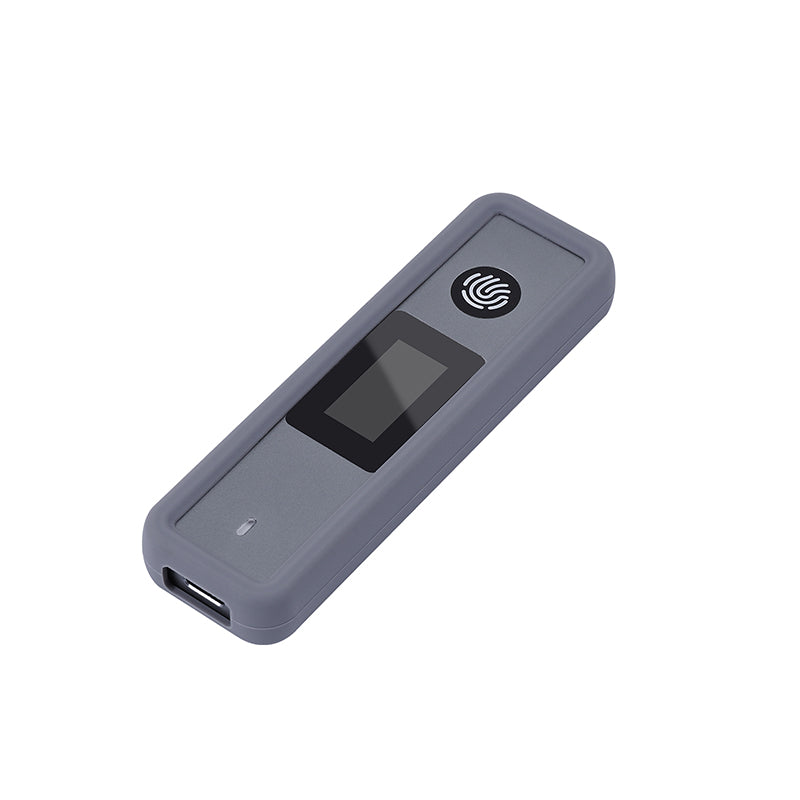
Share
Sustainability in Consumer Electronics: A Growing Focus at HKTDC 2025
The conversation around sustainability is no longer limited to fashion or food—it’s rapidly transforming the electronics industry. From material sourcing to product packaging, and from supply chain transparency to energy efficiency, sustainability has become a global expectation rather than a marketing slogan.
At the Hong Kong Electronics Fair (HKTDC) 2025, this shift is more evident than ever. Organized by the Hong Kong Trade Development Council (HKTDC), the event gathers thousands of manufacturers, distributors, and buyers from across the world. This year, a growing number of exhibitors are placing sustainable electronics and eco-friendly technology front and center, redefining what innovation means in the global marketplace.
1. The Rise of Sustainable Electronics
According to HKTDC Newsbites (2025), sustainability has moved “from optional to essential” across the electronics sector. Global consumers, particularly in Europe and North America, are prioritizing energy efficiency, product longevity, and recyclable materials when purchasing devices.
Manufacturers are responding by embracing principles of the circular economy—creating electronics that can be easily repaired, refurbished, or recycled. Leading brands like Apple and Samsung have already introduced recycled aluminum and rare-earth materials in their flagship devices, while smaller manufacturers are adopting eco-friendly packaging and more efficient production processes.
This industry-wide shift is not just about reducing environmental impact. It’s also about building trust and compliance. With new international standards—such as the EU’s Right to Repair directive and extended producer responsibility (EPR) policies—companies must now design products that can endure longer life cycles and minimize electronic waste.
At HKTDC 2025, sustainability will no longer be an afterthought—it’s becoming a key measure of innovation and competitiveness.
2. Sustainability Takes Center Stage at HKTDC
HKTDC’s own commitment to sustainability extends beyond the products displayed on the show floor. The organizer has been integrating ESG (Environmental, Social, and Governance) principles into its events for several years.
According to the HKMB article “Powering Hong Kong’s Sustainable Growth” (HKTDC, 2024), multiple trade fairs under the council’s umbrella now feature Green Booth Design Competitions, ESG Pavilions, and low-waste exhibition guidelines. These initiatives encourage exhibitors to use recyclable booth materials, reduce single-use plastics, and incorporate digital solutions to replace printed catalogs.
The Hong Kong Electronics Fair (Autumn Edition) and electronicAsia—two of the most influential electronics trade shows in Asia—serve as platforms for sustainability-focused innovation. In 2024, the joint fairs attracted more than 60,000 professional buyers from 160+ countries and regions, with strong interest in energy-efficient products, wearable technology, and smart home devices. (Source: HKTDC Mediaroom, “Electronics Fair and electronicAsia attract more than 60,000 buyers,” 2024.)
This surge in global attention reflects how eco-friendly electronics are shaping purchasing behavior. Buyers are increasingly evaluating suppliers not just for technical specs or price, but also for green credentials—including sustainable manufacturing, ethical sourcing, and packaging reduction.
3. Emerging Green Tech Categories to Watch
At HKTDC 2025, several key technology segments are expected to lead the sustainability conversation. Each represents a convergence of performance, innovation, and environmental responsibility.
a. Energy-Efficient Chargers and Power Hubs
Fast-charging technology continues to evolve with the rise of GaN (Gallium Nitride) chargers, which offer higher efficiency and lower heat output compared to traditional silicon-based chargers. GaN chargers consume less power while delivering faster results, making them an eco-smart solution for modern devices.
Exhibitors are also introducing multi-port charging hubs designed to reduce the number of individual adapters consumers need—cutting down electronic waste and improving convenience.
b. Durable Cables and Sustainable Materials
The next generation of data cables, such as USB4, is built for both performance and longevity. Brands at HKTDC 2025 are expected to highlight cables made with recyclable aluminum shells, nylon-braided jackets, and lead-free soldering to minimize environmental harm.
Durability itself is a form of sustainability—products that last longer reduce the frequency of replacement, lowering both consumer costs and waste output.
c. Storage Devices with Lower Energy Footprint
Solid-state drives (SSDs) and fingerprint-encrypted enclosures are increasingly popular for professionals seeking secure, high-speed, and low-energy storage. SSDs consume less power than mechanical hard drives, while modern aluminum enclosures support better heat dissipation and recyclability.
These devices align with the sustainable electronics movement by offering both efficiency and eco-conscious design.
d. Smart, Modular Audio and RGB Accessories
Even in lifestyle electronics, sustainability plays a role. Several brands are presenting RGB speakers and modular audio systems that allow users to upgrade or repair parts instead of replacing the entire unit. Combined with Bluetooth connectivity and rechargeable batteries, these innovations reduce waste while enhancing the user experience.
The emphasis on upgradability and energy efficiency shows how design and sustainability can work hand in hand.
4. Why Sustainability Matters for Global Buyers
For international buyers attending HKTDC 2025, sustainability is not just an ethical choice—it’s a strategic business advantage.
Retailers, distributors, and B2B buyers are facing growing pressure from regulators and consumers alike to ensure their supply chains meet environmental standards. Importing or selling products with non-compliant materials or excessive packaging can lead to penalties, lost contracts, or reputational risks.
Sourcing sustainable electronics at trade fairs like HKTDC helps buyers stay ahead of compliance requirements, access new markets, and strengthen their ESG positioning.
Moreover, with more companies integrating carbon reporting and sustainability disclosures into their annual reports, choosing green suppliers directly contributes to achieving corporate sustainability goals.
5. VCOM and the Move Toward Greener Technology
As a long-term exhibitor at HKTDC, VCOM continues to align its product development with global sustainability trends. From high-efficiency charging solutions to durable aluminum SSD enclosures and recyclable packaging, the brand emphasizes quality, longevity, and eco-conscious design.
At HKTDC 2025, VCOM will showcase a series of innovations that combine performance and responsibility—reflecting the company’s belief that the future of electronics lies in sustainable craftsmanship and thoughtful design.
VCOM’s range of USB4 cables, GaN chargers, and biometric storage devices illustrates how brands can pursue both innovation and sustainability without compromise. Each product demonstrates reduced energy consumption, premium durability, and efficient materials use—key values that resonate with today’s environmentally aware market.
6. Looking Ahead: The Future of Green Electronics
The global electronics sector is projected to generate over $1.1 trillion in revenue by 2026 (Statista, 2024), and sustainability will be a major driver of this growth. Consumers are showing a clear preference for brands that demonstrate responsibility, while governments are enforcing stricter sustainability mandates on manufacturing and imports.
As this transformation continues, events like HKTDC 2025 play a pivotal role in connecting eco-innovators, buyers, and policy leaders. They serve as both a showcase of next-generation technology and a catalyst for the industry’s transition toward a cleaner, circular economy.
Conclusion
The Hong Kong Electronics Fair (HKTDC) 2025 is set to be more than just a global marketplace for gadgets—it’s a reflection of how sustainability has become a central pillar of modern electronics design.
From energy-efficient GaN chargers to recyclable aluminum enclosures and eco-friendly packaging, the innovations presented this year demonstrate a shared commitment to reducing waste, conserving resources, and building a smarter, greener future.
For brands like VCOM, embracing sustainable electronics is not just a trend—it’s a long-term strategy that connects performance, responsibility, and innovation in one forward-looking vision.

